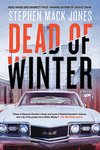

Lansing native Stephen Mack Jones’ newest thriller, “Dead of Winter,” which is set in Detroit’s Mexican Town neighborhood, was selected as a 2022 Michigan Notable Book. It’s the second time Jones has won the award. Jones, who graduated from Sexton High School and Michigan State University, was a late bloomer in terms of being a highly respected novelist.
It wasn’t until after he retired from a career in advertising that he began his second career as a novelist. His three books feature ex-Detroit cop August Snow, who is using the money from his wrongful dismissal suit to redevelop an almost abandoned Detroit neighborhood. Snow is a no-nonsense vigilante of sorts, who rights wrongs for average Detroiters — he’s not afraid to pull the trigger to help them when necessary.
Several other Michigan Notable Book Award winners have their books set in Detroit — including “Miles from Motown,” by Lisa Sukenic, a fictional story of a young Detroiter in the ’60s; “From a Whisper to a Rallying Cry: The Killing of Vincent Chin and the Trial that Galvanized the Asian American Community,” by Paula Yoo, and “Call Me Athena: Girl from Detroit,” by Colby Cedar Smith, a generational historical fiction work.
In the nonfiction genre, there is “Getting to the Heart of the Matter: My 36 Years in the Senate,” the memoir of Carl Levin, one of Michigan’s longest serving U.S. Senators, who died shortly after the book’s release.
The scales of award winners have also tipped toward authors who write about the Upper Peninsula and northern Michigan. Three fictional books with strong ties to the Upper Peninsula made the list this year: “Firekeeper’s Daughter,” by Angeline Boulley, a modern coming-of-age thriller set on an Upper Peninsula reservation, and “Tin Camp Road,” by Ellen Airgood, who explores rural poverty in the Upper Peninsula through the life of a young single mother.
The novel “Never Saw You Coming,” by Erin Hahn, is also set in the Upper Peninsula. It tells the tale of an 18-year-old who moves up north in search of her lost family.
Other award-winning books set in rural northern Michigan include the hilarious “Early Morning Riser,” by Katherine Heiny, which uses Boyne City as the backdrop for a complex love story between a young teacher and an older handyman.
Another fictional account of life in northern Michigan is “The Cut,” by John Wemlinger. Set in Manistee during the late 19th century, “The Cut” explores how a monumental storm threatens the very existence of two young lovers.
Anyone whose made the trip to Mackinac Island will love “The Dockporter: A Mackinac Island Novel,” by two former suitcase movers, Dave McVeigh and Jim Balone.
Nature lovers and trout fisherman will gravitate toward “Trout Water: A Year on the Au Sable,” by Josh Greenberg, who operates a legendary fishing tackle store on one of America’s most historical trout fishing streams. They will also love “Up North in Michigan: A Portrait of Place in Four Seasons,” by Jerry Dennis, who is at his best in this series of essays.
Author David Harden delivered the precious resource of water during the darkest days of the Flint water crisis, and his memoir, “Standpipe: Delivering Water in Flint,” helps define the struggles of those suffering through one of the nation’s worst environmental disasters.
At least eight of the winning books are targeted toward young adult readers.
“Long Road to the Circus,” by Betsy Bird, is set in Burr Oak, is a delightful novel inspired by the real-life story of a young girl who chased her dreams by learning to ride and race an ostrich.
Young readers will also enjoy “Ancestor Approved: Intertribal Stories of Kids,” edited by Cynthia Leitich Smith. This collection of stories enlivens Native American culture, especially as it revolves around an Ann Arbor pow wow.
A number of the young adult award winners are crossovers, which can be enjoyed by readers of all ages. In that vein is John Smolens’ “Day of Days,” which is a tender coming-of-age tale set against one of the nation’s worst school disasters, the Bath School bombing. Smolens, a master of historical fiction, draws on the observations of several young children and how they navigated the aftermath of the bombing.
One science fiction thriller, “The Other Me,” by Sarah Zachrich Jeng, is based on the popular conceit of an alternate world. Closer to reality is “Private Love, Public School: Gay Teacher Under Fire,” by Christine A. Yared, which a shockingly honest consideration of what happens when a popular high school teacher is discovered to be gay.
Finally, there is a bitter-sweet selection that recognizes the life work of author Thomas W. Brunk, who died before seeing his encyclopedic guide to Pewabic pottery published. The book, “Pewabic Pottery: The American Arts & Crafts Movement Expressed in Clay,” stands as the definitive text on the highly collectible Detroit pottery, and his work will live long after him.
Support City Pulse - Donate Today!
Comments
No comments on this item Please log in to comment by clicking here